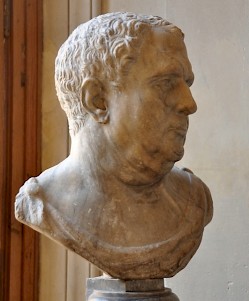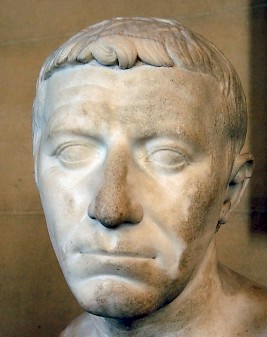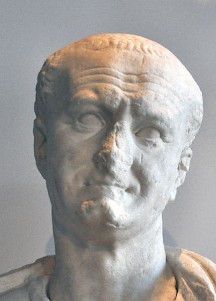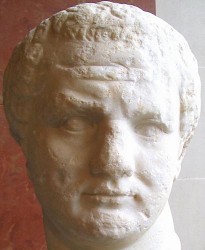Julius Alexander Jr
Tiberius Julius Alexander: Egyptian Jew, Roman governor of Judaea (46-48) and Egypt (68-69), one of the commanders during the Roman siege of Jerusalem (70).

Tiberius Julius Alexander was born as the son of a rich Jew from Alexandria, who was also called Tiberius Julius Alexander. Father Alexander served as chief customs officer and had offered financial help to the mother of the emperor Claudius, Antonia. His brother was the philosopher Philo (c.15-c.50), and his younger son was Marcus, the husband of princess Berenice, the daughter of the Jewish king Herod Agrippa. In other words, the younger Tiberius Julius Alexander belonged to one of the most influential families in the Roman East, a family that stood in three cultural traditions: Jewish, Greek, and Roman. They had the status of Roman knights.
During the reign of the emperor Caligula, a pogrom took place in Alexandria (more). The result was an increase of Anti-Semitism, and a change in Judaism, which started to look inside instead of outside. Where the elder Alexander had been able to combine Judaism and a Graeco-Roman attitude, his son may have had to make a choice. How he combined the two, we do not know; but there is no evidence that he was an apostate.
His first known office was that of commander of the Theban district in southern Egypt, and later, he was made prefect of Judaea (46-48).
Then came the successor of Fadus, Tiberius Alexander. He was the son of Alexander, the chief customs officer of Alexandria, one of the most influential men of his age, both for his family and wealth. He was also more eminent for his piety than his son Alexander, for the latter did not continue in the religion of his country. Under this prefect a great famine happened in Judaea, and queen Helena of Adiabene bought cereals in Egypt at a great expense, and distributed it to those that needed it. Besides this, the sons of Judas the Galilean were executed; I mean that they were the sons of that Judas who caused the people to revolt when [the governor of Syria] Quirinius came to take an account of the estates of the Jews. The names of those sons were James and Simon, whom Alexander commanded to be crucified.note
This is what the Jewish historian Flavius Josephus wrote at the end of the first century. The two men he had executed were probably nationalist rebels of the type that was later known as Zealots. Some twenty years earlier, Josephus had written another book, The Jewish war, in which he had merely stated that Alexander respected the customs of the country and that the people lived in peace (2.220). The two statements support each other: because Alexander arrested the two men the peace remained in the land of Israel.

The next stage of Alexander's career are not completely understood, but it is certain that he was involved in the war between the Roman general Corbulo and the Parthian empire (63). He is mentioned as responsible for the commissariat and was present during negotiations with the Armenian king Tiridates.
In 68, Alexander was made prefect of Egypt, a very important function. This was probably one of the last appointments by the emperor Nero. He now commanded two legions, III Cyrenaica and XXII Deiotariana, which he was forced to use against the Jews of Alexandria - ethnic violence was not uncommon in ancient Egypt. According to Flavius Josephus, no less than 50,000 Jews were killed when Alexander sent the legions to the Jewish quarter. this meant the end of the once very large and powerful Jewish community of Alexandria. (The full story can be read here.)
The Jewish insurrection in Alexandria was not an isolated incident. War had broken out in Judaea. The Jews had revolted for fiscal reasons, but there was an increading messianic element in their motivation. (Go here for the story of the Jewish insurrection.) The emperor Nero had sent one of his best generals to suppress the Jewish rebellion: Titus Flavius Vespasianus, or (to use the English rendering of his name) Vespasian. He was very successful; early in 69, he had already broken the back of the revolt, although the siege of Jerusalem still remained.
Meanwhile, civil war had broken out among the Romans. Nero had committed suicide, and an old senator named Galba had succeeded him (June 68). However, in the first week of 69, the governor of Germania Inferior, Vitellius, had accepted the purple as well. When this news became known in Rome, Galba was lynched near the Lacus Curtius on the Roman Forum. His successor was Otho, who was defeated by Vitellius (April).
On the first of July, the governors in the Roman empire administered the oath of loyalty, but Tiberius Julius Alexander demanded that his men promised to be loyal to Vespasian. A few days later, the commander of the Roman forces in Judaea accepted the title. It may be suspected that he had in fact taken the initiative, and that Alexander was just a pawn in a larger game, offering Vespasian an opportunity to decline the title if the legions in the region did not side with him immediately.

But they duly hailed Vespasian as their emperor, and the governor of Syria, Gaius Licinius Mucianus, sided with the rebels as well. Within a few weeks, the rich provinces in modern Turkey, the eastern client kingdoms and the Roman navy of the Black Sea followed suit. A battle plan was made: the war in Judaea was left to the new emperor's son Titus, Vespasian was to go to Alexander in Egypt (and cut off the grain supply of Rome), and Mucianus was to command an army and march to the west. It was expected that the legions of the Danube sided with the rebels. As it turned out, the Danube army arrived in Italy first and defeated Vitellius' legions in one of the longest battles in Roman history (October).
Vespasian arrived in Egypt in November. There were festivities, and it turned out that the emperor was able to cure people with the touch of his hands. It is possible that Alexander had arranged something, because a miraculous cure was something that the Egyptian populace appreciated.

In the first days of 70, Vespasian and Alexander learned that the army of the Danube had captured Rome and lynched Vitellius. While Vespasian proceeded to Italy, Alexander was added to the staff of the emperor's son Titus, who had to take Jerusalem. The prince's greatest asset was his loyalty, but he was not acquianted with the country or with generalship, so he needed advisers. Alexander was made chief staff and may have conducted the war; another adviser was Flavius Josephus, the historian of this campaign (go here for the story of the siege of Jerusalem).
When the city had been captured, Alexander proposed to keep the Temple intact, but Titus overruled him (go here for discussion).
One papyrus seems to mention Alexander in the seventies or eighties as praetorian prefect, but the text is confused. On the other hand, it was not uncommon that the prefect of Egypt became praetorian prefect. We simply do not know what became of Tiberius Julius Alexander.